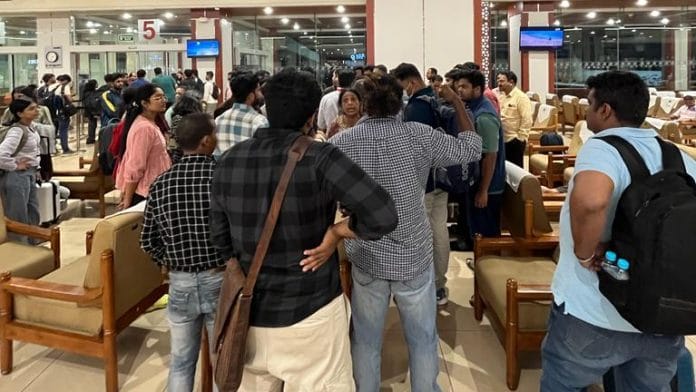After 10 hours in the airport, the teeming masses were tired, worried, and irritable. They only wanted to know when their plane would take off. But the aircraft never left Kochi for Delhi that Sunday night. It was scheduled to depart at 8.45 pm on 14 January, but passengers were informed about the cancellation only at 3 am the following day.
Frustrated passengers stuck inside planes, having meals on the tarmac, missing connecting flights, and cancellation—fog in Delhi and other parts of North India has led to myriads of flight-related issues, with over a thousand cases of delays and cancellations this winter. But the situation was made worse by the apathetic response from airlines and the lack of communication. So much so that even the DGCA took notice and issued SOPs on flight delays after the past week of mishaps, asking airlines to publish “accurate real-time” information.
There was no information on the Kochi-Delhi flight. The duty manager was unreachable. Official communication from the airline was coming after announcements by third-party flight trackers, and there were no airline representatives to be found. The manager’s reasoning for both his absence and the delay in relaying information was that his phone had run out of charge.
It’s no wonder then that tired passengers are breaking down and attacking airline staff and crew, verbally and physically. Violence is never the answer; the crew and ground staff may be as disempowered as the passengers. But an open line of communication instead of silence and false promises will go a long way in easing tensions.
Communicating early is key
The cancellation of the Kochi-Delhi flight was never formally announced. Airport staff said it to those sitting closest to the gate and the word spread causing confusion and panic. Tempers rose and enraged passengers surrounded the staff, refusing to let them go until they provided answers.
The now infamous punch onboard the Delhi-Goa flight was also a symptom of the bigger problem—a lack of communication.
Russian model Evgenia Belskaia, who was on the same flight, said that after delaying the flight for 10 hours, the pilot lashed out at passengers for “asking too many questions”. While she clarifies that this doesn’t justify the passenger punching the pilot, it provides clarity on why the incident took place. “He [the pilot] is supposed to support them [the passengers], make them feel better, not worse,” she posted on Instagram.
All the 600 delays and 76 cancellations on Sunday had this in common—too many questions and not enough answers.
Delays were announced haphazardly. Those with connecting flights were panicking, doctors who had surgeries scheduled were on edge, students with exams were on the verge of tears, and those who had to go back to work the next day were counting how many hours of sleep they could function on.
All the while there were no staff members present, at least in the Cochin International Airport; they only came to announce delays. No questions were answered because there was nobody to ask them to. Perhaps the staff were afraid of the abuse they would face.
But if airlines really want to protect their crew, the first step is to communicate clearly.
Can’t fool the passengers
The way cancellations were announced, in one to two-hour increments, indicated that either no one in the chain of command knew what was going on or that information was intentionally being withheld.
Airlines can’t give out crumbs of information and expect passengers to meekly wait and blindly follow instructions. But resolving airline-passenger conflicts begins with respect.
The first step is to communicate the delay time. But more importantly, the reason for the delay has to be told to the passengers.
Fog is not a good enough reason. That is a predicted phenomenon that airlines must prepare for. For example, Sunday’s flight was delayed because the flight that was supposed to depart from Kochi never took off from Delhi.
Relaying this reason also means airlines can’t buy time by fooling passengers. It takes a little over three hours to travel between Kochi and Delhi. Announcing incremental delays while blaming the weather gives passengers false hope.
The DGCA has acknowledged this too and asked airlines to cancel flights in advance when a delay of over three hours is expected. But for this to happen, it’s not just the airlines that need to communicate, the airports and DGCA must as well.
The lack of functioning runways in the Delhi airport combined with crew shortages also contributed to the delay.
‘What next’ after cancellation?
Communication shouldn’t stop at cancellation. What happens after must also be clearly stated. Where should one go for a refund? Which counter takes care of rescheduling? What are the flights available for a reschedule? Getting this information shouldn’t have to be a game of Chinese whisper.
The airlines rebooked flights for those on the cancelled Kochi to Delhi flight, but now they were flying only two days later. “Where will I stay,” asked a distraught tourist with her young daughter in tow. Nobody gave her an answer.
Airlines must also stop rewarding the loudest, most unruly passengers. It was the ones picking fights with the manager who got special attention.
Perhaps, if the airline had taken all the measures and relayed the information correctly and timely, then the man who punched the IndiGo pilot would be on his honeymoon in Goa—not in jeopardy of finding his name on a no-fly list.
Views are personal.
(Edited by Prashant)






